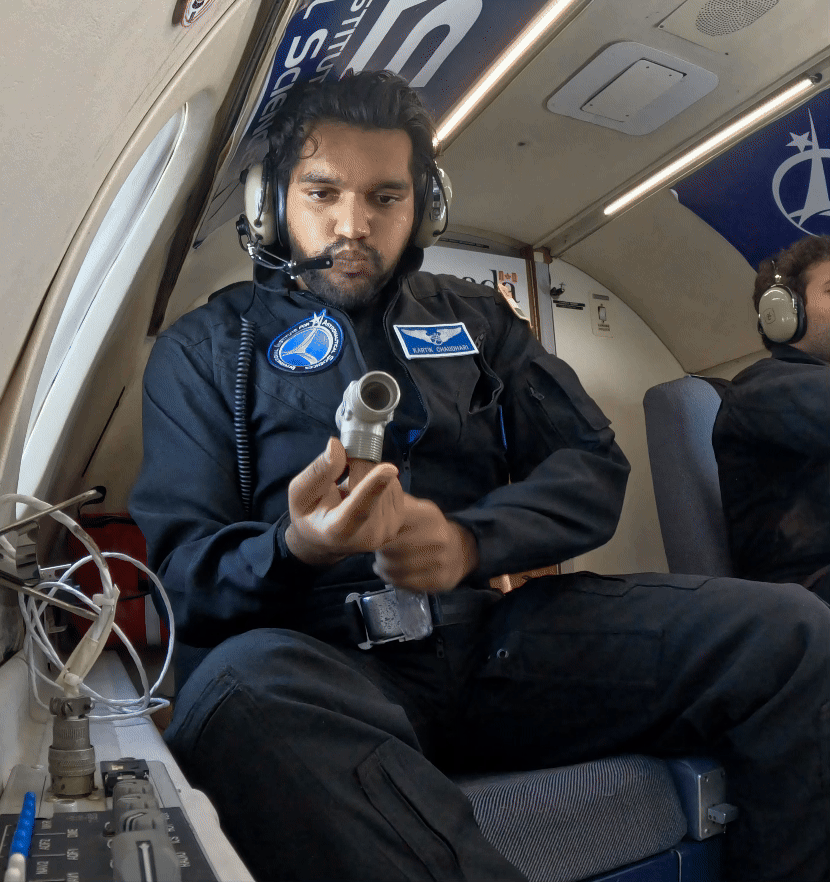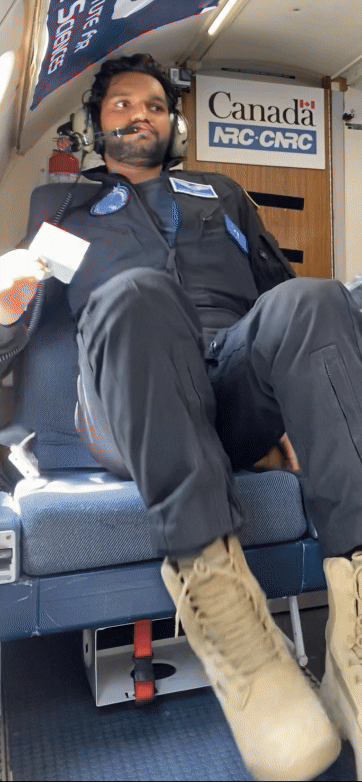Astronaut alumnus runs experiments in zero-gravity scenarios
Kartik Chaudhari credits his degree from the Information Networking Institute for his success in becoming an astronaut in Canada.
Kartik Chaudhari is an alumnus from the Information Networking Institute (INI). He graduated in 2021 with a MS in Information Technology - Mobility, which is now the MS in Mobile and IoT Engineering (MSMITE). This degree would go on to serve him at a truly unique job: training to become an astronaut.
Chaudhari is currently working in Canada for the National Research Council of Canada as an astronaut systems trainee. His job is to research how objects move in zero-gravity to better track and predict their paths. This research can prevent catastrophes in real spacecrafts.
People use items on a spacecraft just as they would in a kitchen or a bathroom on Earth. The only difference is, without gravity, the items can end up floating away. “You have walls and walls of computers and very, very sensitive instruments around you,” explains Chaudhari. “If I let an item refloat, I do impart some velocity to it. So, it might take two or three hours to drift and hit something. But it will eventually.
Although items tend to move slowly, even a gentle bump from a mundane object could be disastrous in space. “Hitting the wall is fine. If it goes and hits the ventilation system, now all of a sudden you’re jeopardizing eight lives,” Chaudhari emphasized.
Chauhari compared it to a scene from the movie Gravity staring Sandra Bullock. Her character lights a candle and ends up losing track of it and it goes on to cause lots of problems for the ship.
Although Chaudhari’s team is ready to go to space, the experiments need to take place in zero-gravity scenarios on Earth first. That’s where high-altitude flights come in.

Source: Kartik Chaudhari
Chaudhari performs an experiment in zero-gravity.
Calculating the physics and training a machine learning algorithm on trajectories of objects is hard enough. But Chaudhari doesn’t just run the numbers; he goes up in the craft to run the experiment himself. As the payload specialist for this experiment, he must be the one to both oversee the experiment and perform it. Zero-gravity is a very unnatural state for the human body to be in. “It just takes a lot of getting used to. And your body is constantly rejecting the environment.”

Source: Kartik Chaudhari
Chaudhari acclimatizes to zero-gravity.
Chaudhari mentioned that his background taking Compute Hardware and AI Engineering courses really served him in this role. He was one of the first students to begin taking these courses at CMU and is very thankful that he was able to do so. He recalls a rapid prototyping class where teams of students worked with sensor technology. They extracted data from those sensors to be able to give patients with Huntington’s disease a better life. “We did actually work with hospitals around the world, with proper clinics, doctors, and hardware engineers with those sensors, which is pretty important,” adds Chaudhari. “That kind of sensor interaction and all, you don’t learn it otherwise.”
Looking to the future and thinking about the possibility of getting up into space, Chaudhari says it is still a long shot. “We launch around four people per year to space, roughly. So, even if you come down from a few thousand people to a few hundred people, to go from those few hundred people to that four is always a challenge.”
But Chaudhari is happy just to be working on interesting projects in the company of fellow astronauts who have repaired the Hubble space telescope and hold the record for longest spacewalk. He says he is the only person on his team with an information transfer background working on how information interacts with hardware directly. He thanks INI, the College of Engineering, and CMU for making his path possible.
